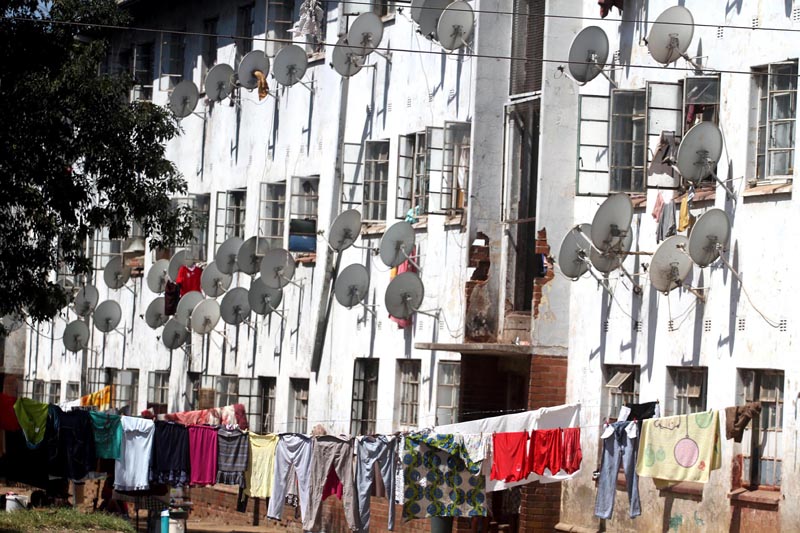
THE filth, violent crime, prostitution, drug addiction and dilapidation commonly associated with the overcrowded Mbare hostels, most of which have outlived their lifespan, is a well-known tale.
BY PHYLLIS MBANJE
For many years, the suburb has been crying out for a revamp, but life has gone on, as the situation has been accepted as “normal” for a place like Mbare.
“That’s just the way it is,” became a common refrain.
In 2012, then Local Government minister Ignatius Chombo said the government had plans to pull down the 58 dilapidated hostels, including Matapi, Nenyere, Shawasha, Mbare and Matererini, originally built to house a small number of male black migrant labourers during the colonial era.
But today, the hostels — built for bachelors — house over 70 000 tenants that call the derelict structures home.
Some were born and raised in the muck and are now family men themselves, raising their offspring in the very same space that their umbilical cords are buried.
A case of a vicious cycle aptly describes life in these hostels.
- Chamisa under fire over US$120K donation
- Mavhunga puts DeMbare into Chibuku quarterfinals
- Pension funds bet on Cabora Bassa oilfields
- Councils defy govt fire tender directive
Keep Reading
Approaching Matapi, one is met with conflicting images.
Amid the filth and depressing outlook, giant murals take up the larger part of the collapsing buildings that need more than a fresh coat of paint.
The majestic artwork is a breath of fresh air, drawing attention away from the drab environment.
The graffiti was an initiative of cousins, Warren Maruta and Beszil Matsika, who were eager to give the place a positive image.
“We were tired of the negative comments and so wanted to show that there is hope and talent in abundance,” said Maruta, who stays in the Matererini block of flats.
But behind the breathtaking murals lies reality, which the community has accustomed itself to over the years.
A huge rat — the size of kitten — darts from a small clump of grass and makes for the pile of rubbish, emitting a fetid odour, which assails nostrils.
A few metres away, two young women are plaiting each other’s hair, oblivious of the scene behind them. They are too concerned with their nightly adventures.
Four toddlers are playing with a skipping rope in the dirty puddles of water, their grubby little feet splashing the grey-green water everywhere.
They are obviously amused at their little game and are not deterred by the filth that surrounds them.
About 30 minutes later, they take a break from their little efforts and make a beeline to the young women, who are still engrossed in their juicy titbits.
One of the women shoos them away, but they are defiant.
Reluctantly, one of the young women, who only identified herself as Clara, sashays to a nearby vendor, selling all sorts of things ranging from snacks to cigarettes.
Underneath Clara’s loosely-tied sarong, a pair of minute red shorts can be seen and traces of make-up from last night are still visible on her face.
The smeared eyeshadow and bright red lipstick give her young face a macabre look.
She comes back with four small packets of snacks and carelessly throws them at the children, who grab wildly at the flying sachets.
One or two land right in the dirt, but no one is concerned, the children sit down and start munching away, chattering happily.
To a stranger, there is everything wrong with this picture, but the sound of happy laughter and casual conversation sends another message.
“Yes, we do not have much and are obviously not comfortable with the way things are, but this is home,” says Clara, who is the more talkative of the two.
Clara is only 20 years old, but already has two children.
The older one is turning four next month, while the younger is slightly over two years old.
She is a vendor by day, but doubles as a commercial sex worker by night, plying the Zindoga area in Waterfalls.
“Business is low, but I have to put food on the table and it doesn’t matter how or where I get it,” she shrugs her shoulders.
Clara offers to show her room, which she shares with three other single women and their children.
In total, the room accommodates three adults and five minors.
Discoloured pieces of cloths divide the small room into three parts. There are no beds, just small threadbare mattresses.
There are no curtains on the window, but just some old newspapers held in place by duct tape.
In one corner, there is a greasy paraffin stove and a few plates and pots. A small plastic bag contains, salt, some tea leaves and mopani worms.

On the wall, there is a blown-up poster of United States RnB sensation, Beyoncé Knowles in a shimmering elegant gown, smiling seductively at the camera.
“People say I look like her and it so happens I love her music,” Clara grins.
The winding staircase that leads outside is dark and cold. Someone is playing their radio loudly and a baby is howling their lungs out.
Down the block from where Clara and her friend are sitting is a group of young men aged between 17 and 24.
They are gambling and smoking dagga, the sickly smell wafts in the air leaving behind an overpowering stench. They are unperturbed by curious visitors.
“We have seen some white people from as far as the Netherlands, who have come here to see how we live,” says the shortest of the men and most likely gand leader who calls himself Gosky.
Asked how they earned their living and what they spent their time doing, the youths look at each other before Gosky once again offers a not-so-true response.
“Tongokiyakiya imwe iya, maiziva (We just do a little bit of this and that),” he says.
But a few minutes later, a Nissan Tiida pulls up and one of the young men dashes over and leans over the window into the car.
He comes back and as if acting on cue, Gosky pulls a small packet from a satchel that is slung on his shoulder and walks up to the car.
He hands over the small parcel and is handed something, which he quickly shoves into the pockets of his jeans.
It’s a smooth transaction, done in less than five minutes. As the car drives off, the group gathers their stuff and make off into one of the buildings.
An elderly-looking man, who is busy mending an old shoe, shakes his head and carries on with the task at hand.
His resignation at the situation mirrors the attitude of the general populace, who couldn’t care less about what goes on in the dingy buildings.
Spokesperson for the Harare City Council — which is in charge of the hostels — Michael Chideme says they are aware of the situation and are frantically looking for funds to revamp the hostels.
“Once we secure resources, we will turn the rooms into family units,” he said.
In the meanwhile, life goes on for the residents at the flats.











